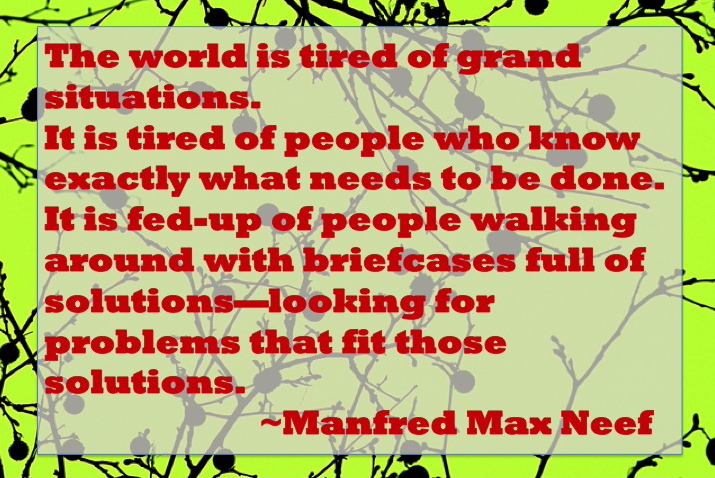This is a guest post by Gboyinde Onijala, the fifth in a series of seven blog posts from my International Development Communications students at Georgetown University’s Public Relations and Corporate Communications Masters Program.
“Oh my goodness! I got into the Peace Corps! I am so ready for this opportunity to make a difference in the lives of children in [insert the name of any “poor” African country]!”
 I’ve lost track of the number of times that I have read statements like this posted on my friends and acquaintances’ social media pages. I absolutely admire and commend those who commit to a life of service and are genuinely passionate about development work. There is no doubt that the need is great and our world needs more people who aren’t afraid to tackle really complex issues, working beside the underserved with integrity, humility, and a great sense of purpose.
I’ve lost track of the number of times that I have read statements like this posted on my friends and acquaintances’ social media pages. I absolutely admire and commend those who commit to a life of service and are genuinely passionate about development work. There is no doubt that the need is great and our world needs more people who aren’t afraid to tackle really complex issues, working beside the underserved with integrity, humility, and a great sense of purpose.
Unfortunately, what I have seen and continue to see happen is that many of these people, in a very short amount of time, end up losing that spark that once guided them. They go from being fearless advocates to being critical pessimists.
How do I know? Well, not only because I personally have gone through a similar transition, but also because I’ve seen the how disenchanted and disengaged family members and close friends, who once thrived in nonprofit work, have become.
I remember leaving high school fired up and ready to learn about all the different ways I could “save the world.” I served as the president of the African Diaspora Club for three years while at Towson University, making grand plans with my peers on how we would go back to our respective countries and do things the “right way.” I interned at the university’s Women’s Center, working with the director to plan conferences and set up partnerships with international NGOs that believed in a woman’s ability to bring positive change and growth in her community. I would tell myself (and anyone who would listen to my musings) how I knew that my calling was in the nonprofit sector. Yes, I knew I wouldn’t make a lot of money, but I would have more freedom to work on projects and serve with a team of people who were just as committed to the cause.
My very first job after college was with a small nonprofit in Silver Spring, Maryland, whose mission was to “empower diverse girls to become exceptional students, positive leaders, and healthy young women.” I worked as their Development and Communications Associate for approximately three years. It felt like every month we had an idea for a new project or program that not only would change the lives of the girls we worked with in Maryland, but also those around the world. Our programs were that good. We worked with consultants to refine our objectives and develop ways to measure intangible outcomes, such as “64% of girls will develop goals focused on overcoming their marginalization in the classroom and/or schools,” and “76% of girls will utilize their new skills to increasingly demand to be heard on issues that impact them and others in their local and global communities.”
 I didn’t take long before I started to feel frustrated and confused. I felt like all we were doing was going around in one big circle. The enthusiasm that used to come so naturally for me became a struggle. I wasn’t sure how to communicate about the work and all of our successful programs if I wasn’t sure that I even believed in it.
I didn’t take long before I started to feel frustrated and confused. I felt like all we were doing was going around in one big circle. The enthusiasm that used to come so naturally for me became a struggle. I wasn’t sure how to communicate about the work and all of our successful programs if I wasn’t sure that I even believed in it.
I know that I am not the only one who has felt this way. And as I have analyzed my experience and the experiences of my loved ones, I have come to believe there are six key reasons why we end up feeling defeated and how we can avoid this:
- We fail to set realistic expectations. The truth of the matter is that you are not going to “save the world.” You probably won’t even have the type and breadth of impact that you have pictured in your mind. The work isn’t always as “glamorous” as we think and we are not realistic about the amount of time it takes for true social change to happen. What have I learned to do? Set SMART—specific, measurable, achievable, relevant and time-bound—goals. It helps me manage my expectations and keeps me moving in the right direction.
- We don’t do our homework. We go into countries or start working for a particular organization without taking the time to truly get to know what the issues are that we are trying to help solve. That includes understanding the history of the challenge, the people it has impacted, the barriers to success, the actual needs of the people you are working with, and what it is going to take to get the job done. I have learned to ask a lot of questions and take the initiative by doing some formal and informal research. If you are going to work in another country, take some time to get to know the people. Speak with the elders and the youth to get an authentic perspective on what’s going on and how you can support the dreams and goals that they have for their communities, i.e. not the goals you’ve set or your host organization has set.
- We are too confident in our “abilities.” You may be a “jack of all trades,” but the truth is, there is probably one or two things at which you really excel. Instead of trying to do it all, why not focus on bringing your best to the table and either build or find a team of people diverse in talent and experience to fill whatever gaps that exist?
- We don’t ask for help. Burnout is real. When you take on too much at once or attempt to do things that honestly don’t match your skill set, you will burn out. I know that our society sometimes makes it seem like it is a sign of weakness to ask for help, but the best thing that you can do for yourself is find a core group of people both at your job and outside of work from which you can freely seek advice and assistance.
- We avoid asking ourselves (and others) hard questions. The truth can be a scary thing to face. I have learned that frequent “gut checks” are essential. I ask myself questions like “Am I really cut out for this?” “What skills do I have?” “Am I adding value to this project?” “Do they really need my help?” “Do I have any ulterior motives?” “Is it time to move on?” Not only do I ask myself these tough questions, I also have really great people in my life who aren’t afraid to ask me these tough questions as well. I hold myself accountable and they do the same.
- We lose sight of the big picture. We cannot afford to forget the overarching reason why we do what we do. The vision and mission have to drive the work. What does this mean for us who work in (or desire to work in) development? All of our programming, campaigns, projects and initiatives must align with the mission and objectives laid out before us. We lose the integrity and authenticity of our work when jump ahead with certain projects and attempt to create programs, and then try to tweak and stretch the mission to fit them.
So, before you set out to change the world and while you are on the journey, I encourage you to take the time you need to ensure that you can offer your very best. Keep preparing and keep evaluating whether you understand the work and what it will require of you. Your passion and convictions are key to never losing sight of the reason you do what you do.
***
 Gboyinde Onijala Missihou is a cause-driven communicator who has a passion for working with youth and young adults. She currently works as the Senior Communications Specialist for Montgomery County Public Schools, the largest school system in Maryland. She assists the Director of Public Information and Web Services in managing the daily activities of the Department, including serving as a spokesperson for the school system and developing and implementing strategies to improve internal and external communications. Gboyinde has a bachelor’s degree in mass communications and is a candidate for a master’s degree in public relations and corporate communications at Georgetown University.
Gboyinde Onijala Missihou is a cause-driven communicator who has a passion for working with youth and young adults. She currently works as the Senior Communications Specialist for Montgomery County Public Schools, the largest school system in Maryland. She assists the Director of Public Information and Web Services in managing the daily activities of the Department, including serving as a spokesperson for the school system and developing and implementing strategies to improve internal and external communications. Gboyinde has a bachelor’s degree in mass communications and is a candidate for a master’s degree in public relations and corporate communications at Georgetown University.
In addition to her communications work, Gboyinde is also passionate about planning events that help bring diverse groups of people together for a common purpose. From cultural showcases, to weddings and corporate events, her work as an Assistant Coordinator with RAE Affairs has helped sharpen her skills in project management, strategic planning, and fundraising.
***
Related Posts
Who’s thinking about social change?
Time to listen? Time to address our personal barriers
Don Popo and where to find “it”

More revealing story.